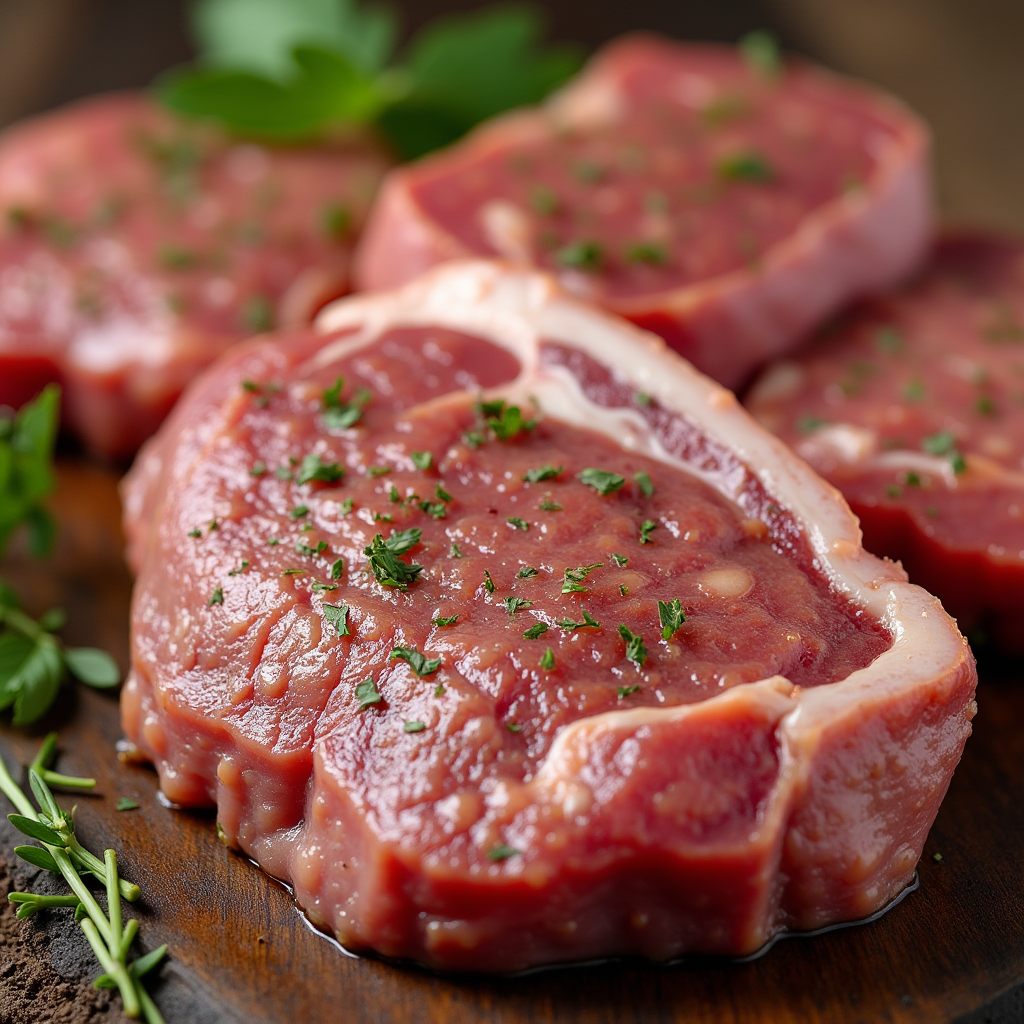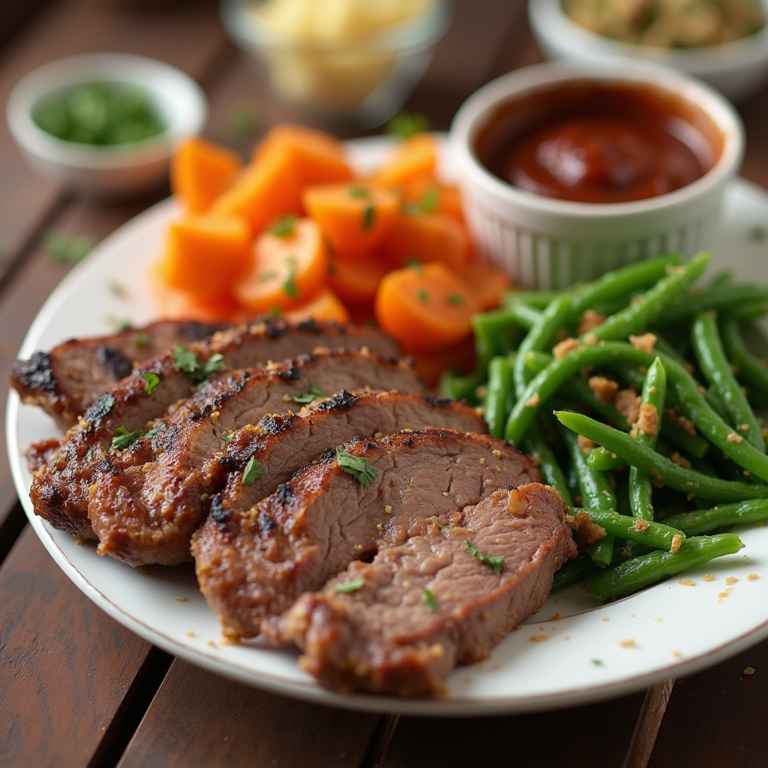Organic meat has gained significant attention in recent years as more consumers prioritize health, sustainability, and ethical food choices. Unlike conventionally raised meat, organic meat is produced under strict guidelines that emphasize natural farming practices, animal welfare, and environmental stewardship. This guide delves into what makes organic meat unique, its benefits, and how to make informed choices when purchasing and preparing it.
What is Organic Meat?
Organic meat comes from animals raised in accordance with USDA Organic standards, which are designed to ensure the highest levels of quality and sustainability. These standards cover every aspect of the animal’s life, from birth to processing, and include several key requirements:
- No Antibiotics or Hormones: One of the most significant differences between organic and conventional meat is the prohibition of synthetic growth stimulants, antibiotics, and hormones in organic farming. This means animals are raised without the routine use of antibiotics, which are often administered in conventional farming to promote growth and prevent disease. Instead, organic farmers focus on preventive measures, such as providing a clean environment and a balanced diet, to keep animals healthy.
- 100% Organic Feed: Animals raised for organic meat must be fed a diet that is 100% organic and free from genetically modified organisms (GMOs). The feed is also grown without synthetic pesticides or fertilizers, ensuring that the animals consume only natural, high-quality ingredients. This not only benefits the animals but also contributes to the overall nutritional profile of the meat.
- Outdoor Access and Humane Living Conditions: Organic farming standards require that animals have access to the outdoors and sufficient space to move around freely. This promotes natural behaviors, such as grazing and foraging, and ensures that animals are raised in humane conditions. The emphasis on animal welfare is a cornerstone of organic farming and sets it apart from conventional practices, which often involve confined spaces and limited mobility.
Benefits of Organic Meat
Choosing organic meat offers a range of benefits, both for individuals and the environment:
- Health Benefits: Organic meat is free from synthetic hormones, antibiotics, and GMOs, which can have potential health implications for consumers. By choosing organic, you reduce your exposure to these substances and enjoy meat that is often richer in nutrients, such as omega-3 fatty acids, due to the animals’ natural diets.
- Environmental Sustainability: Organic farming practices prioritize soil health, water conservation, and biodiversity. By avoiding synthetic pesticides and fertilizers, organic farms reduce their environmental impact and promote healthier ecosystems. Additionally, the emphasis on outdoor access and humane treatment of animals aligns with sustainable farming principles.
- Ethical Considerations: For many consumers, the ethical treatment of animals is a significant factor in their food choices. Organic farming standards ensure that animals are raised in humane conditions, with access to outdoor spaces and a natural diet. This aligns with the values of those who prioritize animal welfare and seek to support more ethical food systems.
How to Buy and Enjoy Organic Meat
When purchasing organic meat, look for the USDA Organic label, which certifies that the product meets all organic standards. Buying from local farmers’ markets or trusted brands can also ensure higher quality and transparency. When cooking organic meat, its natural flavors and tenderness often shine through with simple preparation methods, making it a versatile and delicious choice for a variety of dishes.
By understanding what makes organic meat unique and its numerous benefits, you can make informed decisions that align with your health, ethical, and environmental values. Whether you’re a seasoned organic enthusiast or new to the concept, incorporating organic meat into your diet is a step toward a more sustainable and conscious way of eating.
For a comparison of other meat options, explore our boneless beef recipes, which highlight versatile and flavorful cuts of conventional and organic beef.
Benefits of Organic Meat
1. Health Benefits
- Chemical-Free: Organic is free from synthetic antibiotics, hormones, and pesticides.
- Higher Nutritional Value: Grass-fed organic contains more Omega-3 fatty acids and antioxidants.
2. Environmental Sustainability
- Reduced Pollution: Organic farming minimizes the use of synthetic chemicals, benefiting soil and water health.
- Biodiversity: Encourages crop rotation and natural pest control, promoting ecological balance.
3. Ethical Farming Practices
- Humane treatment of animals, including outdoor access and natural diets, is central to organic farming.
Learn more about ethical and healthy protein options in our article on turkey lunch meat, which explores the nutritional benefits of organic poultry.
Types of Organic Meat
- Organic Beef
Organic beef is celebrated for its rich, robust flavor and tender texture. It comes from cattle raised on organic feed, free from synthetic pesticides, GMOs, and antibiotics. Many organic beef options are also grass-fed and pasture-raised, meaning the cattle graze on natural grasses in open fields. This not only enhances the nutritional profile of the meat, often making it higher in omega-3 fatty acids and antioxidants, but also supports sustainable farming practices. When shopping for organic beef, look for labels that specify both “USDA Organic” and “grass-fed” for the highest quality. - Organic Poultry
Organic chicken and turkey are popular choices for their versatility and lean protein content. These birds are raised in free-range environments, allowing them to roam outdoors and engage in natural behaviors. They are fed an organic diet free from synthetic additives and are never given antibiotics or hormones. This results in meat that is not only healthier but also more flavorful and tender compared to conventionally raised poultry. Organic poultry is an excellent option for those seeking a cleaner, more ethical source of protein. - Organic Lamb
Organic lamb is prized for its distinct, clean flavor and tender texture. Like other organic meats, it comes from animals raised without synthetic hormones, antibiotics, or GMO feed. Organic lambs are typically pasture-raised, grazing on organic grasses and forage, which contributes to the meat’s rich taste and nutritional benefits. Lamb is a great choice for those looking to explore bolder flavors while adhering to organic and sustainable principles.
How to Buy Organic Meat
- Where to Shop
Finding high-quality organic meat is easier than ever, thanks to the growing availability of organic products. Specialty stores, such as local farmers’ markets, organic grocers, and butcher shops, often stock a wide selection of organic meats. These venues are excellent for sourcing fresh, locally raised options and supporting small-scale farmers. Additionally, many mainstream supermarkets now carry organic meat, making it more accessible to a broader audience. Online retailers also offer convenient options for purchasing organic meat, often with detailed information about sourcing and farming practices. - Labeling Tips
When shopping for organic meat, it’s essential to understand labeling to ensure you’re getting a genuine product. The most reliable indicator is the USDA Organic label, which certifies that the meat meets strict organic farming standards. This includes requirements for feed, living conditions, and the absence of synthetic additives. Be cautious of terms like “natural” or “grass-fed,” as these do not necessarily mean the product is organic. “Natural” simply indicates that the meat contains no artificial ingredients, while “grass-fed” refers only to the animal’s diet and does not guarantee organic practices. Always look for the USDA Organic seal to ensure you’re purchasing a product that aligns with your values.
By exploring the different types of organic meat and learning how to shop for them, you can make choices that benefit your health, the environment, and animal welfare. Whether you’re grilling organic beef, roasting organic chicken, or savoring organic lamb, you’re not only enjoying delicious meals but also supporting a more sustainable and ethical food system.

Cooking Tips for Organic Meat
Cooking meat requires a nuanced approach to highlight its natural flavor:
Preparation Tips
- Use marinades with fresh herbs, garlic, and citrus to enhance flavor.
- Avoid overcooking to preserve moisture and tenderness.

Cooking Techniques
- Organic Beef: Use low-temperature roasting or sous vide for even cooking.
- Organic Poultry: Brining improves texture and flavor before roasting or grilling.
Discover more about effective cooking methods in our guide to ground sausage dinner recipes.
Cost vs. Value of Organic
Why is Organic More Expensive?
- Stricter farming practices and certifications increase production costs.
Value Beyond Price
- Investing in organic supports sustainable agriculture and offers long-term health benefits.
For budget-friendly recipes that incorporate organic ingredients, visit our collection of quick dinner ideas for two.
FAQs About Organic Meat
Q: Is organic meat healthier?
A: Yes, organic meat is generally considered healthier than conventional meat. It is free from synthetic chemicals, such as antibiotics, hormones, and pesticides, which are commonly used in conventional farming. Additionally, organic meat often has a higher nutritional value, including more omega-3 fatty acids and antioxidants, due to the animals’ natural diets and outdoor access.
Q: Where can I buy organic meat?
A: Organic meat is widely available at specialty stores, farmers’ markets, and many mainstream supermarkets. Look for the USDA Organic label to ensure the product meets strict organic standards. Online retailers, such as Organic Prairie, also offer a convenient way to purchase high-quality organic meat, often with detailed information about sourcing and farming practices.
Q: How should I store organic meat?
A: Proper storage is essential to maintain the freshness and quality of organic meat. Refrigerate it immediately after purchase and use it within 3–5 days. For longer storage, freeze the meat in airtight packaging or freezer-safe containers. Frozen organic meat can last for several months, making it a convenient option for meal planning and reducing food waste. Always follow safe food handling practices to ensure the best results.
Conclusion
Organic is an excellent choice for those seeking healthier, environmentally sustainable, and ethically sourced options. From beef to poultry , its superior flavor and clean nutritional profile make it a standout choice for home cooking. Enhance your next organic meal with complementary dishes like our lobster meat recipes or keep things simple with a hearty blackstone recipe for a satisfying, wholesome dinner.
Elevate your cooking with the unparalleled quality and taste of organic meat!

